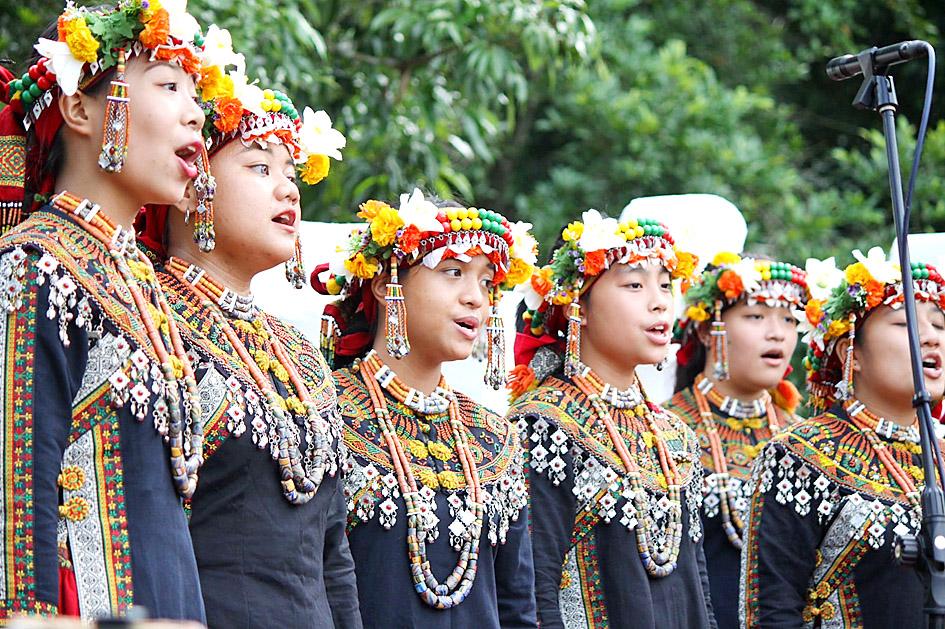The award-winning Puzangalan Children’s Choir is in dire financial straits due to the COVID-19 pandemic and is in burning need of funding for its continued operation.
The choir from Pingtung County’s Majia Township (瑪家), who sang the national anthem at President Tsai Ing-wen’s (蔡英文) inauguration ceremony, was founded to help indigenous children combat poverty and boost their confidence, as well as to provide much-needed educational resources.
The choir over the past 10 years has mainly relied on donations and holding fundraising shows to pay its expenses and for its scholarship programs, and when it thought the most difficult times were over, the COVID-19 pandemic struck.

Photo courtesy of the Union Bank of Taiwan
Donations from the public have fallen since a local COVID-19 outbreak last year and businesses have become less willing to sponsor the choir.
After the choir received just four invitations to perform in the past year, Union Bank of Taiwan and the Union Culture Foundation have jointly initiated a “Puzangalan Children’s Choir training and education program” on their fundraising platform at ubot.org.tw/uborgdonate, calling for people from all walks of life to help the children through these difficult times.
All the funds raised would be used to train and support choir members in need.
“When the children feel uneasy, I always tell them to ask themselves whether they are prepared. Persevering and practicing is especially crucial at this time because the efforts devoted now will be helpful when opportunities present themselves in the future,” choir executive director Tsai Yi-fang (蔡義方) said.
The aims of the choir are to change the children’s lives through music and pass down indigenous cultures. Puzangalan means “hope” in the Paiwan language.
As well as the children learning and practicing traditional indigenous songs every Saturday, the children also receive considerable assistance with their school work.
The choir charges no fees from its members, who are elementary to high-school Paiwan and Rukai children, as 90 percent of them do not come from well-off families.
In light of this, the choir has also established scholarship programs to help impoverished families with tuition fees and other expenses.
The choir hopes to put the children’s minds at ease regarding financial problems, allowing them to focus on their studies.

Taiwan’s Liu Ming-i, right, who also goes by the name Ray Liu, poses with a Chinese Taipei flag after winning the gold medal in the men’s physique 170cm competition at the International Fitness and Bodybuilding Federation Asian Championship in Ajman, United Arab Emirates, yesterday.

Costa Rica sent a group of intelligence officials to Taiwan for a short-term training program, the first time the Central American country has done so since the countries ended official diplomatic relations in 2007, a Costa Rican media outlet reported last week. Five officials from the Costa Rican Directorate of Intelligence and Security last month spent 23 days in Taipei undergoing a series of training sessions focused on national security, La Nacion reported on Friday, quoting unnamed sources. The Costa Rican government has not confirmed the report. The Chinese embassy in Costa Rica protested the news, saying in a statement issued the same

A year-long renovation of Taipei’s Bangka Park (艋舺公園) began yesterday, as city workers fenced off the site and cleared out belongings left by homeless residents who had been living there. Despite protests from displaced residents, a city official defended the government’s relocation efforts, saying transitional housing has been offered. The renovation of the park in Taipei’s Wanhua District (萬華), near Longshan Temple (龍山寺), began at 9am yesterday, as about 20 homeless people packed their belongings and left after being asked to move by city personnel. Among them was a 90-year-old woman surnamed Wang (王), who last week said that she had no plans

TO BE APPEALED: The environment ministry said coal reduction goals had to be reached within two months, which was against the principle of legitimate expectation The Taipei High Administrative Court on Thursday ruled in favor of the Taichung Environmental Protection Bureau in its administrative litigation against the Ministry of Environment for the rescission of a NT$18 million fine (US$609,570) imposed by the bureau on the Taichung Power Plant in 2019 for alleged excess coal power generation. The bureau in November 2019 revised what it said was a “slip of the pen” in the text of the operating permit granted to the plant — which is run by Taiwan Power Co (Taipower) — in October 2017. The permit originally read: “reduce coal use by 40 percent from Jan.